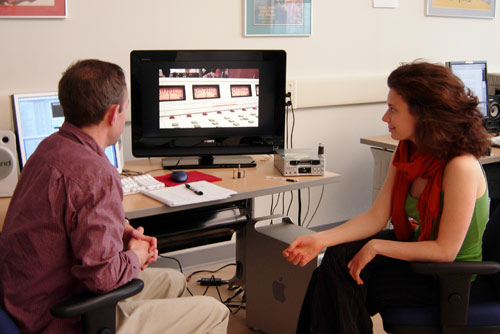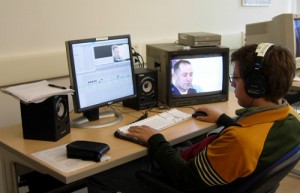Students Explore Nursing Profession Through Documentary Film Course

Baltimore native Esther McCready grew up in segregated, discriminatory world and was denied admission to the University of Maryland School of Nursing. At that time, the school did not admit “Negros.”
With help from NAACP civil rights leaders like Thurgood Marshall, she sued for admission to the university, and in April 1950, McCready won her right to attend classes.
In the spring semester course “Making the Science Documentary,” molecular biology and biochemistry major Christopher Doucette ’11 had the opportunity to interview and film McCready about being the first African American woman to attend Maryland’s School of Nursing. He also interviewed Rosetta Sands, the first African American dean in the University of Maryland’s undergraduate program.
“I asked these women about their stories and really analyzed how racial relations affected their school and working experience as nurses before, during and after the Civil Rights movement,” Doucette says. “I have always been interested in how science has been represented through both still and moving images, and this class really taught me how documentaries can be effective tools in conveying information and educating the public about pressing social and scientific issues.”
Doucette and his classmates Sarah Gillig ’09 and Vytaute Pivoriunaite ’12 traveled to the University of Maryland School of Nursing Living History Museum, where they conducted research on the history of nursing. Each student made his or her own film for the class, which was co-taught by Manju Hingorani, associate professor of molecular biology and biochemistry, and Jacob Bricca, adjunct assistant professor of film studies.
The science and film hybrid class, designated a Service Learning Course, is designed to introduce students to topics in the life sciences and the basics of documentary filmmaking, in order to teach students the skills and art of communicating science-related issues through visual media.
Students learn technical filmmaking skills such as composition, lighting and editing, and study science documentaries to understand functional models of non-fiction filmmaking. In complementary sessions, students learned about specific diseases, at the molecular, cellular, and human level, to develop a knowledge base that enables intellectual engagement with the nursing profession.
“I wanted students to gain an appreciation of the biological sciences at the molecular and organism level, learn about diseases like cancer and diabetes that have a devastating impact on so many people, and learn about biomedical research as it relates to the nursing profession,” Hingorani explains.
The 12 enrolled students worked under the guidance of Ann Anthony, a retired home care registered nurse and educator. Anthony made arrangements for the students to meet nurses working in hospice, oncology and palliative care at Middlesex Hospital; nurses working at the Joslin Diabetes Center in New London, Conn.; and a certified nurse specializing in wound care at Middlesex Hospital. Anthony also lectured on the history of the nursing profession, explaining how the nursing profession has evolved in the past 50 years.
“I was very impressed with the integrity and open-mindedness of all the Wesleyan students, and how serious they were in their projects,” Anthony says. “It was fascinating to see how these students with no medical or nursing background approached their films with a liberal arts perspective.”

Classmates Chris Skorik ’09, Kaitlin Halibozek ’10 and Elliott Skopin ’11 explored the role of gender in the field of nursing for their films. They interviewed two male nurses, one at Lawrence and Memorial Hospital in New London, and one from Middlesex Hospital, about their experiences in the profession.
“Nursing is currently dominated by about 90 percent females due to historical and cultural associations between the role females in society and nursing,” Skorik says. “As we had expected, they faced social barriers to their acceptance as nurses, especially early on in their careers. Confusion and occasional opposition was common from family members, for example ‘why aren’t you becoming a doctor instead?’ and from patients ‘wait, so you’re not my doctor?'”
All three students shot footage and interviews, and created three separate cuts based on their own preferences. From seven hours of raw footage, they created three, eight-minute documentaries highlighting different aspects of this interesting phenomenon.
This is the second iteration of “Making the Science Documentary” taught by Hingorani and Bricca. The first class, taught in Spring 2007, focused on four research labs at Wesleyan. The course is part of the interdisciplinary Science and Film Courses initiative begun in 2005 with support from Wesleyan’s Fund for Innovation, the National Science Foundation and the Howard Hughes Medical Institute.
Doucette’s film on African American nurses and Halibozek’s film on male nursing will be shown at the 2009 Nightingale Awards for Excellence in Nursing, Connecticut’s largest state-wide nursing recognition program on April 30. Doucette’s film will be shown at a gala in Hartford, and Halibozek’s film will be shown at a gala in New London.

